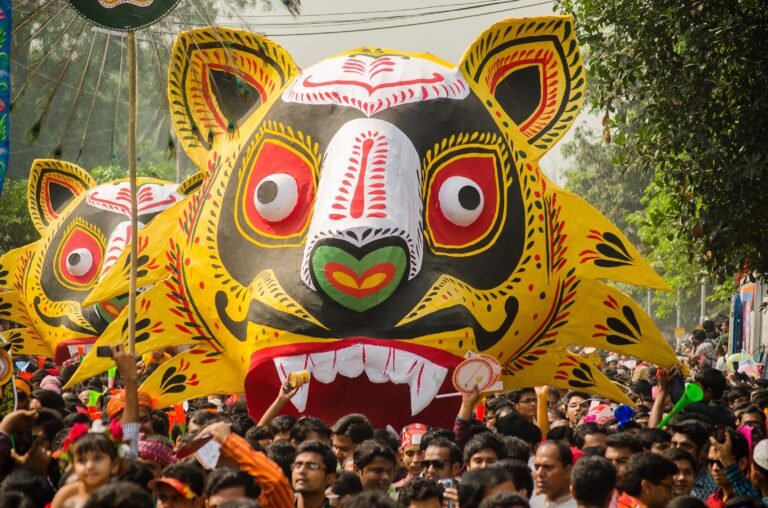Contenus
ToggleIn short
Poila/Pohela Boishakh (Bengali: পহেলা বৈশাখ) is the first day of the Bengali calendar which is also the official calendar of Bangladesh. This festival is celebrated on April 14 in Bangladesh and April 14/15 in the Indian states of West Bengal, Tripura, Jharkhand and Assam (Barak Valley) by the Bengalis. The festival is celebrated with processions, fairs and family time. The traditional greeting for Bengalis in the new year is শুভ নববর্ষ “Shubho Noboborsho” which is literally “Happy New Year”.

Pohela Boishakh, the Bengali New Year
During Mughal rule, land taxes were collected from Bengalis according to the Islamic Hijri calendar. This calendar was a lunar calendar, and its new year did not coincide with solar agricultural cycles. According to some sources, the festival was a tradition introduced to Bengal during the reign of Mughal emperor Akbar to time the fiscal year to the harvest, and the Bangla year was thus called Bangabda.
Akbar a demandé à l’astronome royal Fathullah Shirazi de créer un nouveau calendrier en combinant le calendrier lunaire islamique et le calendrier solaire hindou déjà utilisé, et cela était connu sous le nom de Fasholi shan (calendrier des récoltes). Selon certains historiens, cela a commencé le calendrier bengali. Selon Shamsuzzaman Khan, il pourrait s’agir de Nawab Murshid Quli Khan, un gouverneur moghol, qui a d’abord utilisé la tradition de Punyaho comme « un jour de collecte cérémonielle de l’impôt foncier », et a utilisé la politique fiscale d’Akbar pour lancer le calendrier bengali.
Selon Shamsuzzaman Khan et Nitish Sengupta, l’origine du calendrier bengali n’est pas claire. Selon Shamsuzzaman, il s’appelle Bangla shon ou shaal, qui sont respectivement des mots arabes (سن) et persans (سال), ce qui suggère qu’il a été introduit par un roi ou un sultan musulman. » En revanche, selon Sengupta, son nom traditionnel est Bangabda. On ne sait pas non plus s’il a été adopté par Alauddin Husain Shah ou Akbar.
The tradition of using the Bengali calendar was perhaps started by Husain Shah before Akbar. Whoever adopted the Bengali calendar and the new year, Sengupta says, helped collect land taxes after the spring harvest based on the traditional Bengali calendar, because the Islamic Hijri calendar created administrative difficulties in fixing the date of collection.
Some historians attribute the Bengali calendar to the 7th century King Shashanka. The term Bangabda (Bangla year) is also found in two Shiva temples several centuries older than Akbar's era, suggesting that the Bengali calendar existed before Akbar's time. Various dynasties whose territories extended into Bengal, before the 13th century, used the Vikrami calendar. Buddhist texts and inscriptions created during the Empire period Pala mention "Vikrama" and months such as Ashvin, a system found in Sanskrit texts elsewhere in the ancient and medieval Indian subcontinent.
In rural Bengali communities of India, the Bengali calendar is credited as "Bikromaditto", like many other parts of India and Nepal. However, unlike those regions where it begins in 57 BCE, the Bengali calendar begins from 593 CE, suggesting that the starting base year was adjusted at some point.
Social networks
Picture
